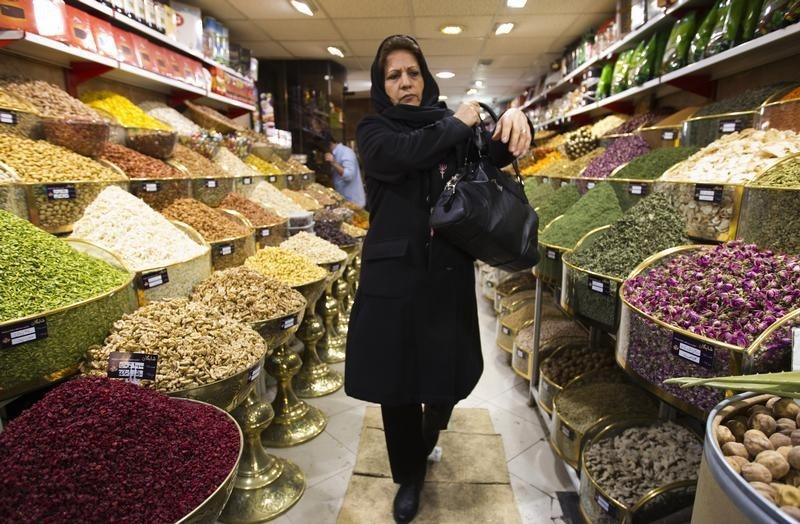By Parisa Hafezi
ANKARA (Reuters) - As prices of food, water and electricity rise further beyond reach, struggling Iranians are losing belief in their pragmatic president and his promise of a brighter future.
The country has been hit by the double hammer blows of persisting Western sanctions over its nuclear activities and plunging oil prices - but its leaders tell the people that adversity will make them stronger.
This offers scant comfort to many ordinary Iranians struggling to support their families as high unemployment and low wages take their toll.
They had pinned their hopes on President Hassan Rouhani, who won power in 2013 with pledges to improve the economy by ending the decade-long nuclear stand-off with the West - but a comprehensive deal has still not materialised.
"All these promises of improving the economy are just nice words," said Morad Rezaian, a father-of-five who owns a small grocery shop in the southern port city of Bandar Abbas.
"I can't feed my kids with empty promises."
Mid-way through Rouhani's first term, he has not only angered political hardliners who oppose any rapprochement with the U.S. "Great Satan", but is losing the belief of many of the middle and lower-income Iranians who voted him in and are now shouldering much of the burden of the economic woes.
Many ships bringing grain have been turned back from Iranian ports over the past year because Tehran cannot pay suppliers, driving up food prices.
Ghanbar Emadi, a private-sector employee in the north-western city of Tabriz, said the cost of a loaf of "barbari" bread had risen by around a third in the past three months alone to 10,000 rials ($3).
"Can we afford to buy goods? Of course not. Seems our leaders live in another country than we do when they talk about economic success."
DAMAGE
For years OPEC member Iran has offset the damaging impact of sanctions with high oil revenues, with much of the country's food and many of the manufacturing parts used to assemble goods in its factories paid for with "petrodollars".
But crude prices have halved since June, slashing revenues and compounding the effect of sanctions that have reduced Iran's oil exports by 60 percent to around 1 million barrels a day.
"They talk about improved economy - maybe on paper but not in reality. The price of goods is increasing fast and our purchasing power is declining," said 38-year-old housewife Masumeh Zandi in the Caspian Sea port of Rasht.
Rouhani's administration has repaired some of the economic damage caused mainly by sanctions, including stabilising the currency and using conservative monetary and fiscal policies to halve the official annual inflation rate to around 20 percent.
But more than a year after reaching an initial agreement with the six major powers over its nuclear programme, a final deal has not been struck to end the sanctions that have prompted the government to cut food and energy subsidies in a bid to ease squeezed state finances.
"I am not an economist but I know how much I am spending every month," said 42-year-old teacher Mahsa Hosseini in Tehran.
"The price of bread, electricity, water and natural gas is increasing. Why? We are an energy-rich country. What happened to all those election promises of Rouhani?"
The state of economy has always been a central factor in shaping Iran's political evolution since the country's 1979 Islamic revolution that toppled the U.S.-backed Shah.
If Rouhani cannot make good on his promise to lift sanctions, he could lose the support of many Iranians and cede influence to hardliners in the country's complex political structure - leading to a deterioration in relations with the West, diplomats and analysts say.
"Rouhani's political career depends on improving the economy. The oil price fall is not helping the government. People are losing hope and in the streets people speak of little else but economic hardship," said a senior Western diplomat based in Tehran.
UNEMPLOYMENT
Under the interim nuclear accord, Iran suspended its most sensitive nuclear work in return for easing some economic sanctions. But major foreign investments have not taken place because of continued uncertainty on whether sanctions will be eased further.
Over 15 percent of workers are unemployed and many jobs pay a pittance. Lifting sanctions would trigger a fresh round of private-sector investment and is the key to rescuing Iran's economy, analysts say.
"No one really wants to do business in Iran. Everything depends on the nuclear deal. With the oil prices going down every day, lack of a final deal means we will suffer more," said 32-year-old Mohammad Reza, a real estate agent in the central city of Isfahan who declined to give his surname.
"Prices of properties are high and nobody can or wants to buy properties. They are scared to invest in a country with no clear future," he added.
Some diplomats say the coming months will be crucial for the economy - and for Iran's pragmatic president.
If Rouhani succeeds in penning a final accord, his position will be strengthened and his second term in office guaranteed, analysts say.
"But in case of failure of the talks, hardliners will have an upper hand and Iran will become more hostile to the West," said Iran-based analyst Saeed Leylaz.
For Iranians, the cost is clear.

"Life is very expensive," said Rezaian from Bandar Abbas. "I was hoping that it would end with resolving the nuclear issue, but there is no deal and there is no hope for a better life."